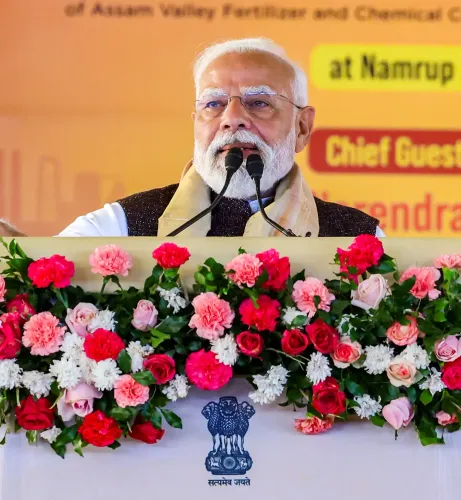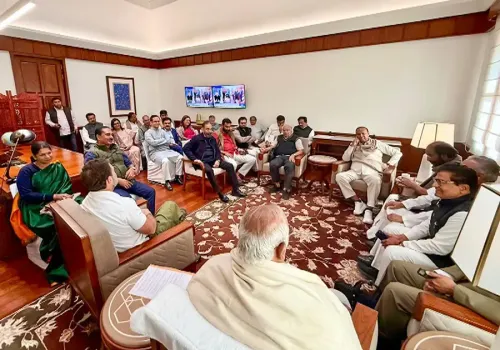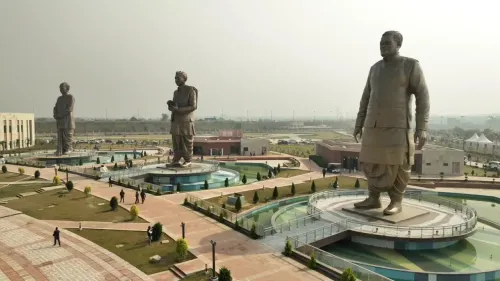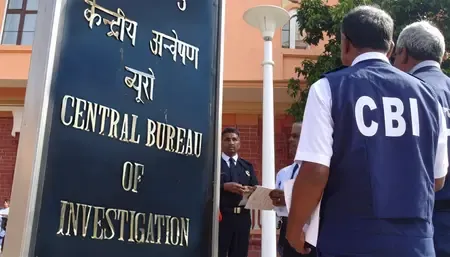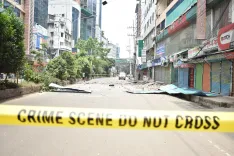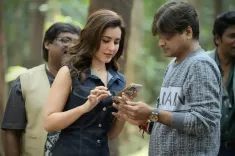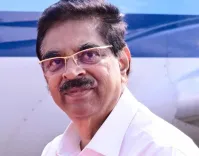Is India Really a Vishwaguru? Sam Pitroda Weighs In (IANS Interview)
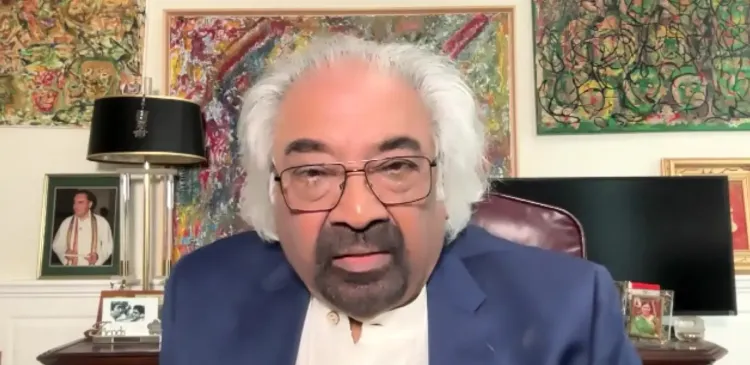
Synopsis
Key Takeaways
- Concerns over electoral integrity: Pitroda emphasizes the need for transparency in India's electoral process.
- Role of youth: He highlights the importance of youth in protecting democracy.
- Critique of BJP's narrative: Pitroda dismisses the idea of India as a 'Vishwaguru' as exaggerated.
- Call for unity: He urges political parties to rally behind Rahul Gandhi for fair elections.
- Focus on regional stability: Pitroda advocates for a foreign policy centered on peace within South Asia.
New Delhi, Sep 19 (NationPress) Indian Overseas Congress Chairman Sam Pitroda has expressed profound worries about India’s electoral integrity, foreign policy, and its perception on the global stage.
Supporting Rahul Gandhi, the Leader of Opposition in the Lok Sabha, in his recent remarks regarding "vote theft" and the significant role of youth in upholding democracy, Pitroda emphasized, in an exclusive interview with IANS, the necessity for civil society, political entities, and young people to come together to safeguard India's democratic principles.
He criticized the ruling BJP for promoting the image of India as the "Vishwaguru," labeling it as mere propaganda, and cautioned against the escalating global threats to democracy.
Here are some highlights from the interview.
IANS: What is your perspective on Rahul Gandhi's allegations against the Election Commission regarding "vote theft"?
Sam Pitroda: Rahul Gandhi’s press conference last Thursday was quite revealing. Many of us have been voicing concerns for years that something is amiss. While we may not know who is behind it, a significant number of people have lost faith in the electoral process. I raised concerns about EVMs 3–4 years ago, but it went unnoticed. Now, Rahul is addressing the right issues, and we must rally behind him.
IANS: Rahul Gandhi has called upon Gen Z to protect democracy. Do you think his appeal is influenced by youth movements in Nepal and Bangladesh?
Sam Pitroda: It's not about imitating protests. The electoral outcomes impact future generations more than those of us who have limited time left. The youth’s future is at risk. Democracy should empower everyone, and Rahul is correct—he cannot achieve this alone. Political parties, civil society, youth leaders, and legal experts must all contribute their voices.
IANS: What is your take on the reluctance of INDIA bloc leaders to support Rahul Gandhi?
Sam Pitroda: I urge all leaders within the INDIA bloc to stand united with him. The people of India deserve elections that are free and fair.
IANS: How do you perceive the tariffs imposed on India by US President Trump?
Sam Pitroda: The US has imposed 50% tariffs, which is alarming. This will create numerous challenges, affecting Indian businesses, employment, and exports, and it will take time to establish new customer bases. This situation is unfavorable for India.
IANS: What are your thoughts on the "vote chori" issue?
Sam Pitroda: The critical question is whether we can guarantee free and fair elections. The current circumstances suggest that vote theft is a reality. This matter should not be viewed through a communal or partisan lens; it concerns fundamental rights. The Election Commission must be held accountable, and the Supreme Court should intervene if required.
IANS: Congress has seen benefits when announcing its CM candidates, as seen in Karnataka and Himachal Pradesh. Why is it taking so long to announce a CM face in Bihar? Does Congress need to assert its presence more significantly?
Sam Pitroda: That's an internal matter for Congress. They choose leaders based on who brings the most value. Traditionally, Congress refrains from announcing candidates beforehand. This reflects true democracy and parliamentary principles. We do not operate under a presidential system. The media's influence, substantial spending on public relations, misinformation, and distortion of public opinion have altered perceptions.
We’ve created a narrative where a strong leader is deemed essential for victory. This is detrimental to democracy.
What matters is ensuring the integrity of our electoral system.
IANS: The BJP positions PM Modi as the focal point of every election. Is it challenging to contest against him?
Sam Pitroda: Individuals come and go, but India must persist. This is why Rahul emphasizes the youth, who have the next 70–75 years ahead of them. The core issue is not individual personalities but safeguarding the future for the next generation.
IANS: The BJP frequently mentions George Soros to criticize Congress. How do you respond?
Sam Pitroda: This is false. Congress has no connection with George Soros. I have neither met nor spoken to him. Such allegations are groundless.
IANS: Do you believe Rahul Gandhi can lead Gen Z in India?
Sam Pitroda: There's no need for elaborate planning. Rahul has rightly highlighted "vote chori" as a pivotal issue, but there are additional concerns—economy, unemployment, poverty, minority rights, Dalits, OBCs, and violence. The youth must recognize these issues. Their energy can transform governments and systems, but protests should remain constructive, not destructive.
IANS: Critics suggest the BJP is polarizing Hindu votes by targeting minorities. Do you concur?
Sam Pitroda: There are 200 million Muslims in India—they are Indians, and we must coexist. Look at our neighbors—Nepal, Bangladesh, Pakistan, Sri Lanka—each facing turmoil. India must take the lead in fostering peace and prosperity in South Asia.
IANS: You mentioned the need to protect minorities. CM Mamta Banerjee has argued that targeting illegal Bangladeshis often results in Muslims being targeted. Is the BJP attempting to polarize Hindu votes?
Sam Pitroda: That’s a matter for the BJP to decide. I’m not interested in creating divisions. With 200 million Muslims in the nation, they are part of our community, and we must learn to coexist. Observing the turmoil in our neighborhood—Nepal, Bangladesh, Sri Lanka, and Pakistan—it's evident that we are a nation of 1.5 billion. How can we formulate a foreign policy while our neighbors are in distress? We must take responsibility for ensuring peace and prosperity in South Asia, even if it requires personal sacrifices for the greater good.
IANS: What is your assessment of India’s foreign policy under PM Modi?
Sam Pitroda: Our foreign policy should prioritize our neighborhood. We cannot thrive in an unstable region. We must be willing to sacrifice for peace, rather than seeking global recognition.
IANS: Pakistani cricketer Shahid Afridi has lauded Rahul Gandhi. What is your view on Rahul’s global image?
Sam Pitroda: Rahul Gandhi is intelligent, dynamic, well-informed, and speaks from a principled standpoint. The propaganda against him is diminishing, and people globally are beginning to acknowledge him. Today, the world lacks a young leader who advocates for democracy, human rights, and equality. Rahul fulfills that need.
IANS: How do you interpret the recent agreement involving Saudi Arabia and Pakistan? Under this agreement, if Pakistan is attacked, it would be viewed as an attack on both countries. Given the situations in Nepal and Sri Lanka, is PM Modi's foreign diplomacy lacking coordination with allied nations?
Sam Pitroda: We require a foreign policy that genuinely reassures our neighbors. As the largest nation in the region, we bear a moral obligation to promote peace and prosperity. We cannot afford conflicts with our neighbors.
It’s irrational for India not to seek a peaceful and stable South Asia. While it’s easy to assign blame, let’s work together to resolve these issues.
IANS: What are your thoughts on the abrogation of Jammu & Kashmir’s special status and relations with Pakistan?
Sam Pitroda: Our foreign policy should focus on enhancing ties with neighboring countries. While violence and terrorism exist, culturally and socially, we share common roots. My visits to Pakistan, Bangladesh, and Nepal have always felt like home. We must strive for peaceful coexistence.
IANS: Do you believe Gen Z in India can bring about a change in government similar to what happened in Nepal?
Sam Pitroda: The power of the youth has been evident worldwide. I witnessed the demonstrations during the Vietnam War in the 1960s, and I understand the potential of youthful energy; it can alter systems and governments, leading to generational change, but it must be constructive rather than destructive.
When I observe young individuals engaging in violence or destruction, that is not an appropriate expression of solidarity. It should be meaningful and constructive. Young people have the capability to effect generational change.
I urge the youth of India to raise their voices alongside Rahul Gandhi.
IANS: Global leaders extended wishes to PM Modi on his birthday. Has India's global standing shifted?
Sam Pitroda: This is mere propaganda. We are not a Vishwaguru. If I ask my neighbors, they are largely unaware of Modi or India. The belief that India occupies everyone's thoughts is a myth. International coverage of India primarily revolves around its economy, population, and opportunities. The "Vishwaguru" narrative is exaggerated.


